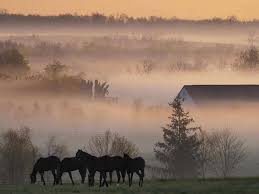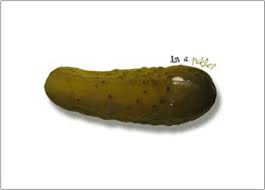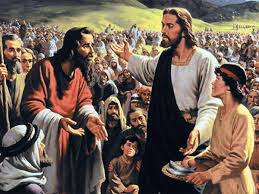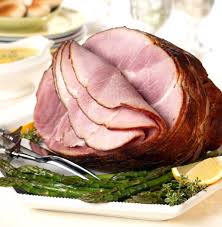Your Guide to a WASP Bar Mitzvah
by Con Chapman

Saul and his wife Sarah are part of a growing movement among parents of children approaching the age of responsibility under Jewish tradition (thirteen for boys, twelve for girls) to curb the growing excesses of the bar and bat mitzvah on display in the movie “Keeping Up With the Steins,” in which two families compete to throw the more lavish ceremony for their sons.

Keeping Up With the Steins
“That movie was an exaggeration,” says Sarah, “but believe me, not by much. We recently attended a bar mitzvah where they had the Rolling Stones for the adults, ‘Fall Out Boy'—whoever they are—for the kids, casino gambling tables, a two-story water slide, Indy-formula race cars and a live rhinocerous. It must have cost a quarter of a million dollars!”

Rhinocerous: Available by the hour, or try our special weekend rate.
So at the suggestion of their rabbi, Jonathan Shapiro, they've come to this town where WASPs—white, Anglo-Saxon Protestants—predominate to consult with Asa and Polly Endicott, an old-line Yankee couple, on how to stage a bar mitzvah party for their son Jacob that will be both tasteful and reserved.
Polly Endicott: Just back from the beauty shoppe
“I met Polly at an Interfaith Council meeting,” says the rabbi. ”She brought day-old donuts for our Thursday morning coffee, so I knew she was one of your typical New Englanders with a highly-developed sense of thrift. A cheapskate!” he adds with a laugh, but Polly doesn't contradict him.

Asa Endicott, cracking his weekly smile.
Asa and Polly are Unitarians, the American denomination with the least emphasis on religious doctrine and ceremony. “The last time anybody heard the words ‘Jesus Christ' at our church was when the janitor fell down the basement stairs,” says Asa, and with his deadpan sense of humor, it's hard to tell whether he's kidding. As a result, the Levensons felt comfortable that the Endicotts would confine their suggestions to party planning, and not veer off into religious matters.
“The first thing you must remember,” Polly tells the Levensons, “is that every penny you spend on your guests is that much less you can spend on your horses.”

Asa and Polly both ride at the Myopia Hunt Club, one of the few venues in America where polo is played. Saul and Sarah laugh at first, but stop when they realize Polly is serious.
“I guess she wasn't kidding about the horses.”
“And don't do your own cooking,” Asa says with a grouchy tone. “The first time I let Polly throw a dinner party all she did was put a roast in the oven and come back between cocktails to see if it was burned yet.”
Asa is a member of the third generation of the Endicott line that has lived off inherited income, holding positions in law or investment firms but not for the money. “If I don't get him out of the house in the morning he's underfoot all day!” Polly says with exasperation. Saul, a successful real estate developer, admires Asa's sense of grace. “He doesn't have to hustle, so he doesn't,” Saul says with a shrug. “I wish I could do the same.”
The flip side of inherited wealth is that the Endicotts are tight with money. “Don't touch the principal!” says Asa with emphasis, and indeed the most work he generally does in a day is to clip an interest coupon off a gilt-edged bond, or check a computer he bought recently (“On sale”, he is quick to point out) to monitor his stocks. “Asa throws nickels around like they're manhole covers,” quips Polly, a comment that causes her husband to turn defensive. “That's an exaggeration,” he says. “I do it more like it's the 8-pound shotput,” a track-and-field event he excelled in at Groton Academy, his prep school.

Old school, non-hip hop version.
Over time the Levensons develop enough confidence in the Endicotts to place the entire responsibility for planning Jacob's bar mitzvah party in their new Protestant friends' hands. “On the day he becomes a man,” says Sarah, “the last thing I want to worry about is the food!”
And so, after Jacob reads from the Torah (the five books of Moses) and the Haftara (the books of the Prophets), and gives a d'var Torah, or discussion of that week's Torah portion, he and his family and friends retire to the Endicott's country club on the North Shore of Boston for the party.

As family and guests stream into the ballroom Saul sees no tables set for dinner, and expresses concern. “Never, ever have a sit-down dinner for a big social event,” Polly says with a tone of authority. “Stick to cocktails and finger food, or your friends will eat you out of house and home.”
“Okay—I guess,” Saul says as he looks over the hors d'oeuvres arrayed on a folding table covered with a worn damask cloth. The offerings include limp celery stalks, olives, pickles, some mini-carrot sticks, Wheat Thins and sliced cheese. “Is that it?” he asks.
“Why, of course not,” Polly says. “There's a cash bar over there.” Saul looks in the direction indicated by his hostess and sees another table stacked with quart size bottles of hard liquor, a cooler of beer and two wine bottles. “What's all that booze for?” he asks.
“That's the WASPy way!” Polly says cheerfully. Saul picks a shriveled pickle from the table, puts it in his mouth and spits it out. “What the hell's the matter with those pickles?” he asks, his face puckered up as if he has swallowed a lemon. “That's a gherkin,” Asa says. “A sweet pickle.”

Gherkin, or sweet pickle: Yum.
“You couldn't find any kosher dills?” Saul asks.
“I don't really like them,” Asa says. “Too sour.”
Rabbi Shapiro joins the group to meet the host and hostess. “It is such a mitzvah what you have done for Saul and Sarah!” he says to the Polly with happiness.
“Are you the fellow who's going to remove the young man's foreskin?” Asa asks after Polly introduces the rabbi.
“Why, no,” Shapiro says, a bit puzzled. “That was taken care of many years ago.”
“Good planning,” Asa says approvingly. “It would have been a mess with the buffet all set up.”
By now the guests have begun to grumble and Sarah expresses her concern that there isn't enough food to feed everyone. “You never read the part in the Bible where Jesus multiplies the loaves and fishes?” Asa asks with a mischievous grin.

“I've got some nice whitefish . . .”
“Uh, no,” Sarah replies.
“Just pulling your leg,” Asa says. “We got a good deal from a caterer. A daughter of a friend of ours. She's very downwardly mobile, a typical path for a WASPy woman who graduates from a Seven Sisters school and wants to do something ‘creative' with her life.” Asa makes a pair of quotation marks with his fingers as he says the word “creative” to let the parents of the bar mitzvah know what he thinks of such foolishness.
“Well, where is she?” Sarah asks.
“She has a dinner party to do first, then we get her for the rest of the night at half off her regular price.”
“Okay—I guess,” Saul says as he looks at his watch. A tired-looking combo is playing songs from the Big Band era-”Begin the Beguine,” “Stardust,” “Rosemarie”—in a somnolent style, providing guests with some diversion as the growls from their stomachs grow louder, like a pride of lions waiting for a herd of gazelles to pass by.

“There she is!” Polly says cheerfully, and the Levensons' heads turn to the swinging doors of the kitchen, where a young woman, Brittany Oliver, in a chef's toque emerges pushing a cart with food—glorious food!—even if it is in the form of canapés.
“Thank God you're here!” Saul says to her. “What have you got for us to eat?”

“Well, over here we have a honey-baked ham, then there's some shrimp . . .”
“Asa didn't tell you we needed something kosher—not trayfe?” Saul asks.
“Guess I didn't mention it to her,” Asa says with a note of regret.
“Wait,” she says, “I did bring something else . . .”
“What?” Sarah asks hopefully.

“Scallops wrapped in bacon!”
Available in Kindle format on amazon.com as part of the collection “Our WASPy Heritage.”
|
0
favs |
1288 views
6 comments |
1626 words
All rights reserved. |
Author's Note
The author has not attached a note to this story.
Other stories by Con Chapman
Tags
This story has no tags.
Groups
-
the comic story

Public group71 members
The pickle bit cracked me up! Well done.
Oy!
In a pinch, you can use Wheat Thins as the eucharist.
Scallops wrapped in challah might have been closer to the mark. The line about the money spent on the horses was hilarious.
This is absolutely brilliant. I read it aloud to my husband and we couldn't stop laughing. I'm Jewish, he's not, we skipped the bar mitzvahs altogether.
I didn't realize how cheap WASPs were until I moved to the east coast.